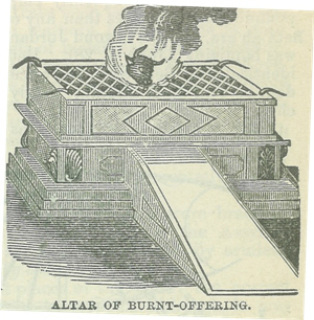| Adonai spoke to Moses: "Speak to Aaron and his sons. Tell them, 'This is the Torah of the sin offering: In a place where you slaughter the burnt offering, there you will slaughter the sin offering before Adonai. It is holy of holies.'" (Leviticus 6:17-18) This week's Torah portion (Tzav) reviews the different types of sacrifices offered by the priests that were introduced in last week's portion. The sin offering (chatat) in this passage is compared to the burnt offering (olah), the prototype and ideal of all offerings. |
It seems odd that this passage places the sin offering on the same level as the burnt offering. The sin offering was used primarily as a way of seeking forgiveness for unintentional sins. As such, it could be brought to the priest by anyone upon the realization that he or she had violated some sacred requirement or prohibition. We might have thought that this was the most ordinary of all sacrificial offerings, a way merely of saying "sorry" for a mistake.
Yet, this verse states the opposite. It goes so far as to call the sin offering "holy of holies." The sin offering is made in the same place—perhaps both physically and spiritually—as the holiest of all offerings. There is a hint here of what the rabbis meant when they praised the repentance from sin, even over not sinning at all.
The Talmud declares (B. Berachot 34b): "Rabbi Abahu said, 'Where those who have repented from sin stand, those who have never sinned cannot stand." Through the act of recognizing error and seeking forgiveness, a sinner becomes superior to the sinless! The greatest perfection, to the rabbis, is not in the perfect. It is the repair of the imperfect.
We even could conclude from this message that sin is, in fact, the vehicle through which we ascend to the highest realms of holiness in our lives. That may seem preposterous, or even perverse. How can a wrong be better than a right? Yet, it does make psychological sense and spiritual sense.
We can learn more from our mistakes than from doing only what is right. When we act in thoughtless ways and see the harm we have caused, we can be shocked by our own failings. The awareness of what we have done can teach us a deeper commitment to doing better in the future. We learn to do what is right for all of the right reasons—not just to follow a rule out of simple obedience, but as a choice informed by personal heartache and hard-won experience.
Each of us carries the baggage of our own past. We all have had moments that we remember and deeply regret—enough to make us wish we could change the past. Even after we have apologized and made restitution to the people we hurt, those moments stay with us. The spiritual power of this teaching, however, is that we can transform the guilt we might feel about those moments into something positive. When we come before God—and come before our own deepest selves—with heartfelt remorse, we turn such moments into a source of personal elevation.
We may not be able to change what we did in the past, but we do have an opportunity to change what our past means to us. It is within our power to heal the wounds we feel from our mistakes and realize that they have made us better, not worse, than we were before.
This is Torah. It is the Torah of the sin offering. Your sins, once you confront them, put you in the place of the highest holiness. They are no longer a source of pangs of guilt, but become a source of strength. Through them, you enter the Holy of Holies.
Other Posts on This Topic:
You are What You Choose to Be
Repairing Everything in an Instant


 RSS Feed
RSS Feed
